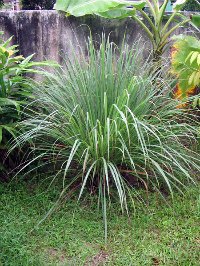|
Cymbopogon citratus
Introduction[Top] 
Cymbopogon citratus is also known as lemongrass, lemon grass, citronella grass, fever grass, cha de dartigalongue, barbed wire grass, gavati chaha, silky heads and herba luisa. Lemon grass is a genus of fifty five species of grasses. It is mostly native to Australia, South Asia and Southeast Asia.
What lemongrass is used for[Top] The Australian aborigines use lemongrass as a remedy for cough and colds, diarrhea and fevers. See all herbal medicine It is used to relieve nasal congestion and coughs in Ayurvedic medicine. It is occasionally used to cure and prevent athlete's foot as well as other fungal infections. In Philippine herbal medicine, lemongrass (called tanglad) used together with ampalaya (bitter gourd) is used to treat diabetes. In Traditional Chinese medicine, lemongrass essential oil is used to for indigestion, rheumatism and headaches. In Cuban folk medicine it is used to lower blood pressure.
How lemongrass is used[Top] Lemon grass can be powdered, dried or fresh. It is commonly used in teas, curries and soups. Lemongrass essential oil is extracted using alcohol or steam distilling fresh cut leaves.
Science says[Top] In Israel, a team of researchers from the Ben Gurion University in 2006 discovered that (Cymbopogon citratus) caused programmed cell death in cancer cells. They conducted in vitro studies, which examined the effects of a molecule called citral which is found in lemongrass on both cancerous and normal cells. The researchers saw that citral induces programmed cell death in cancerous cells, The normal cells were not harmed.
Side affects and cautions[Top]
Lemongrass is generally regarded as safe, lemongrass oil might cause burning and irritation if it is not properly diluted when it is used on your skin. Diabetic or hypoglycemia patients and those who take herbs, supplements or drugs which affect blood sugar are advised to exercise caution.
Return to natural healing home page
|
Loading


